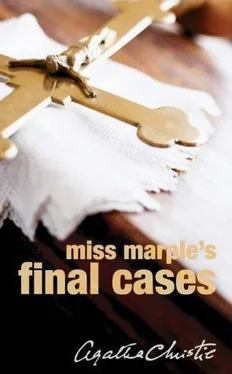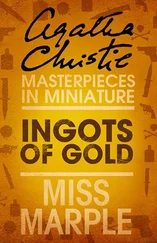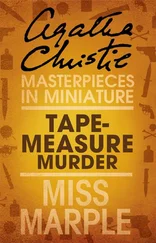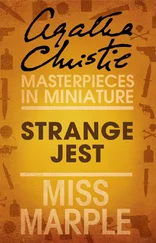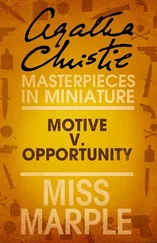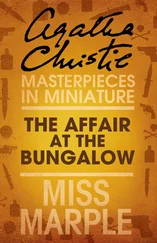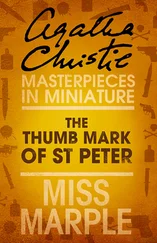Agatha Christie - Miss Marple's final cases
Здесь есть возможность читать онлайн «Agatha Christie - Miss Marple's final cases» весь текст электронной книги совершенно бесплатно (целиком полную версию без сокращений). В некоторых случаях можно слушать аудио, скачать через торрент в формате fb2 и присутствует краткое содержание. Жанр: Классический детектив, на английском языке. Описание произведения, (предисловие) а так же отзывы посетителей доступны на портале библиотеки ЛибКат.
- Название:Miss Marple's final cases
- Автор:
- Жанр:
- Год:неизвестен
- ISBN:нет данных
- Рейтинг книги:3 / 5. Голосов: 1
-
Избранное:Добавить в избранное
- Отзывы:
-
Ваша оценка:
- 60
- 1
- 2
- 3
- 4
- 5
Miss Marple's final cases: краткое содержание, описание и аннотация
Предлагаем к чтению аннотацию, описание, краткое содержание или предисловие (зависит от того, что написал сам автор книги «Miss Marple's final cases»). Если вы не нашли необходимую информацию о книге — напишите в комментариях, мы постараемся отыскать её.
Miss Marple's final cases — читать онлайн бесплатно полную книгу (весь текст) целиком
Ниже представлен текст книги, разбитый по страницам. Система сохранения места последней прочитанной страницы, позволяет с удобством читать онлайн бесплатно книгу «Miss Marple's final cases», без необходимости каждый раз заново искать на чём Вы остановились. Поставьте закладку, и сможете в любой момент перейти на страницу, на которой закончили чтение.
Интервал:
Закладка:
Here Miss Hartnell made a significant pause. It enabled her audience to ask breathlessly, "Tell me, how did he look?"
Miss Hartnell would then go on: "Frankly, I suspected something at once! He was far too calm. He didn't seem surprised in the least. And you may say what you like, it isn't natural for a man to hear that his wife is dead and display no emotion whatever."
Everybody agreed with this statement.
The police agreed with it too. So suspicious did they consider Mr. Spenlow's detachment that they lost no time in ascertaining how that gentleman was situated as a result of his wife's death. When they discovered that Mrs. Spenlow had been the moneyed partner, and that her money went to her husband under a will made soon after their marriage, they were more suspicious than ever.
Miss Marple, that sweet-faced - and, some said, vinegar-tongued - elderly spinster who lived in the house next to the rectory, was interviewed very early - within half an hour of the discovery of the crime. She was approached by Police Constable Palk, importantly thumbing a notebook. "If you don't mind, ma'am, I've a few questions to ask you."
Miss Marple said, "In connection with the murder of Mrs. Spenlow?"
Palk was startled. "May I ask, madam, how you got to know of it?"
"The fish," said Miss Marple.
The reply was perfectly intelligible to Constable Palk. He assumed correctly that the fishmonger's boy had brought it, together with Miss Marple's evening meal.
Miss Marple continued gently. "Lying on the floor in the sitting room, strangled - possibly by a very narrow belt. But whatever it was, it was taken away."
Palk's face was wrathful. "How that young Fred gets to know everything - "
Miss Marple cut him short adroitly. She said, "There's a pin in your tunic."
Constable Palk looked down, startled. He said, "They do say: 'See a pin and pick it up, all the day you'll have good luck.'"
"I hope that will come true. Now what is it you want me to tell you?"
Constable Palk cleared his throat, looked important, and consulted his notebook. "Statement was made to me by Mr. Arthur Spenlow, husband of the deceased. Mr. Spenlow says that at two-thirty, as far as he can say, he was rung up by Miss Marple and asked if he would come over at a quarter past three, as she was anxious to consult him about something. Now, ma'am, is that true?"
"Certainly not," said Miss Marple.
"You did not ring up Mr. Spenlow at two-thirty?"
"Neither at two-thirty nor any other time."
"Ah," said Constable Palk, and sucked his moustache with a good deal of satisfaction.
"What else did Mr. Spenlow say?"
"Mr. Spenlow's statement was that he came over here as requested, leaving his own house at ten minutes past three; that on arrival here he was informed by the maidservant that Miss Marple was 'not at 'ome.'"
"That part of it is true," said Miss Marple. "He did come here, but I was at a meeting at the Women's Institute."
"Ah," said Constable Palk again.
Miss Marple exclaimed, "Do tell me, Constable, do you suspect Mr. Spenlow?"
"It's not for me to say at this stage, but it looks to me as though somebody, naming no names, had been trying to be artful."
Miss Marple said thoughtfully, "Mr. Spenlow?"
She liked Mr. Spenlow. He was a small, spare man, stiff and conventional in speech, the acme of respectability. It seemed odd that he should have come to live in the country, he had so clearly lived in towns all his life. To Miss Marple he confided the reason. He said, "I have always intended, ever since I was a small boy, to live in the country someday and have a garden of my own. I have always been very much attached to flowers. My wife, you know, kept a flower shop. That's where I saw her first."
A dry statement, but it opened up a vista of romance. A younger, prettier Mrs. Spenlow, seen against a background of flowers.
Mr. Spenlow, however, really knew nothing about flowers. He had no idea of seeds, of cuttings, of bedding out, of annuals or perennials. He had only a vision - a vision of a small cottage garden thickly planted with sweet-smelling, brightly coloured blossoms. He had asked, almost pathetically, for instruction and had noted down Miss Marple's replies to questions in a little book.
He was a man of quiet method. It was, perhaps, because of this trait that the police were interested in him when his wife was found murdered. With patience and perseverance they learned a good deal about the late Mrs. Spenlow - and soon all St. Mary Mead knew it too.
The late Mrs. Spenlow had begun life as a between-maid in a large house. She had left that position to marry the second gardener and with him had started a flower shop in London. The shop had prospered. Not so the gardener, who before long had sickened and died.
His widow had carried on the shop and enlarged it in an ambitious way. She had continued to prosper. Then she had sold the business at a handsome price and embarked upon matrimony for the second time - with Mr. Spenlow, a middle-aged jeweller who had inherited a small and struggling business. Not long afterward they had sold the business and come down to St. Mary Mead.
Mrs. Spenlow was a well-to-do woman. The profits from her florist's establishment she had invested - "under spirit guidance," as she explained to all and sundry. The spirits had advised her with unexpected acumen.
All her investments had prospered, some in quite a sensational fashion. Instead, however, of this increasing her belief in spiritualism, Mrs. Spenlow basely deserted mediums and sittings and made a brief but wholehearted plunge into an obscure religion with Indian affinities which was based on various forms of deep breathing. When, however, she arrived at St. Mary Mead, she had relapsed into a period of orthodox Church-of-England beliefs. She was a good deal at the vicarage and attended church services with assiduity. She patronised the village shops, took an interest in the local happenings and played village bridge.
A humdrum, everyday life. And - suddenly - murder.
Colonel Melchett, the chief constable, had summoned Inspector Slack.
Slack was a positive type of man. When he made up his mind, he was sure. He was quite sure now. "Husband did it, sir," he said.
"You think so?"
"Quite sure of it. You've only got to look at him. Never showed a sign of grief or emotion. He came back to the house knowing she was dead."
"Wouldn't he at least have tried to act the part of the distracted husband?"
"Not him, sir. Too pleased with himself. Some gentlemen can't act. Too stiff. As I see it, he was just fed up with his wife. She'd got the money and, I should say, was a trying woman to live with - always taking up some 'ism' or other. He cold-bloodedly decided to do away with her and live comfortably on his own."
"Yes, that could be the case, I suppose."
"Depend upon it, that was it. Made his plans careful. Pretended to get a phone call - "
Melchett interrupted him: "No call been traced?"
"No, sir. That means either that he lied or that the call was put through from a public telephone booth. The only two public phones in the village are at the station and the post office. Post office it certainly wasn't. Mrs. Blade sees everyone who comes in. Station it might be. Train arrives at two twenty-seven and there's a bit of bustle then. But the main thing is he says it was Miss Marple who called him up, and that certainly isn't true. The call didn't come from her house, and she herself was away at the Institute."
"You're not overlooking the possibility that the husband was deliberately got out of the way - by someone who wanted to murder Mrs. Spenlow?"
"You're thinking of young Ted Gerard, aren't you, sir? I've been working on him - what we're up against there is lack of motive. He doesn't stand to gain anything."
Читать дальшеИнтервал:
Закладка:
Похожие книги на «Miss Marple's final cases»
Представляем Вашему вниманию похожие книги на «Miss Marple's final cases» списком для выбора. Мы отобрали схожую по названию и смыслу литературу в надежде предоставить читателям больше вариантов отыскать новые, интересные, ещё непрочитанные произведения.
Обсуждение, отзывы о книге «Miss Marple's final cases» и просто собственные мнения читателей. Оставьте ваши комментарии, напишите, что Вы думаете о произведении, его смысле или главных героях. Укажите что конкретно понравилось, а что нет, и почему Вы так считаете.
